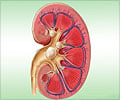
Acute kidney injury, which occurs when a person's kidney function deteriorates over a short period of time, can have severe health consequences, including end stage kidney disease and even premature death.
Morgan Grams,Josef Coreshand colleagues at Johns Hopkins University studied risk factors for AKI in the general population.
Using information from a large population-based group of 11,200 individuals who were followed for an average of eight years, the researchers evaluated the potential links between acute kidney injury and markers of reduced kidney function (estimated glomerular filtration rate, or eGFR) and kidney damage (protein excreted in the urine, or albuminuria), as well as traditionally recognized risk factors, such as age, race, and sex.
The researchers discovered that patients with the highest levels of albuminuria had almost a 5-fold increased risk of developing AKI.
Similarly, the risk of developing acute kidney injury increased, as eGFR decreased. These associations persisted within subgroups of patients categorized by age, race, and sex.
Advertisement
The findings were published in the journal of the American Society of Nephrology.
Advertisement














